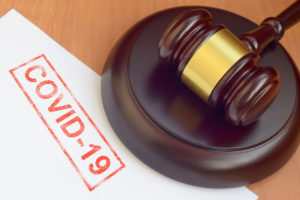This is a summary of the full article written by Katie Buehler and published on Law360.
As America starts to open to face-to-face work, both offices and courthouses are continually adjusting to the safety precautions put in place by the government. This is particularly true for two of the most pronounced patent judges in the country: U.S. District Judge Rodney Gilstrap of the Eastern District in Marshall, Texas, and U.S. District Judge Alan D. Albright of the Western District in Waco, Texas. As in-person jury trials resume in Texas, the two judges have contrasting preferences on Covid-19 safety precautions, particularly when it comes to face-covering procedures and scheduling flexibility.

Face-Covering Precautions
Both judges require everyone in the gallery and anyone in the well that is not sitting at the counsel tables to wear masks; however, they differ in face mask requirements for active trial participants.
Judge Gilstrap believes it is important to see facial expression during a trial, so he asks empaneled jurors and attorneys sitting at counsel tables to wear face shields only. He explains that face shields “allow for a full view of the lawyers’ and jurors’ faces and expressions while providing substantial protection from projection of breath droplets.”
According to Law360, Judge Gilstrap’s current policy allows attorneys at counsel tables to wear face masks but requires them to remove their masks when speaking at the podium. He added that jurors are given the option to wear face masks if they feel they need to. Before Judge Gilstrap, potential jurors were required to wear face masks during voir dire according to a letter the judge sends out attached to jury summonses.
Judge Albright gives jurors the option of wearing face masks or face shields, and the attorneys at the counsel tables can choose whether to face coverings at all.
With the most significant difference between the judge’s policies, the question arises, how important is it to see people’s faces during a trial? According to Jason Bloom, a jury selection consultant, face masks did make it harder to read
expressions and build a rapport with jurors. However, after a few trials, he felt the juror strikes were no different with the addition of face masks.
Scheduling Flexibility
The outbreak of Coronavirus prompted attorneys to seek delays for the trials with both judges. The main concerns that arise are about witnesses not being able to attend trials in person, especially those overseas. Some also argued that public health risks were too high.
Judge Gilstrap held his first trial in August over 4G LTE technology between Optis Wireless Technology LLC and Apple Inc. In July, Apple had attempted to push the trial to October but was denied by Judge Gilstrap. The judge said keeping the trial date was the “better choice” and that calling it off would cause “lengthy, protracted delay, which will simply guarantee material prejudice to all parties.” Many safety precautions were taken during the trial, including the implementation of plexiglass walls, hand sanitizer, and cautionary temperature checks. Optis received a $506 million jury verdict in the case and deemed the trial worth the risk. The court’s precautions made them feel safe, and there have been no reported Covid-19 cases among the attorneys or jurors. Apple’s trial has since been cited by parties that want to keep scheduled trial dates.
“This process is a balance between the rights of the parties to secure a fair trial to resolve their disputes and the needs of citizens, counsel and court staff to function in a safe environment,” Judge Gilstrap said. “This balance is challenging but necessary. It is both art and science, and there is always room for improvement.”
With the extra Covid-19 precautions, trials take longer than they did before. For these reasons, Judge Gilstrap has limited the number of trials he sets per month to one.
Judge Albright agreed four times to postpone the recent trial between Roku Inc. and MV3 Partners LLC over Roku TV products, which eventually started in early October and included additional precautions such as social distancing in the gallery.
His coronavirus precautions start with a contact-tracing form that must be filled out ahead of time by every person entering his courtroom. Safety measures were also put into place within his courtroom including hand sanitizer, air purifiers, and plexiglass walls around the witness stand with cleanings between each witness’ testimony.
Judge Albright and Judge Gilstrap have both restricted the number of attorneys allowed at counsel tables to three apiece. They have also banned bench conferences, telling attorneys to bring up potential issues during breaks outside the jury’s presence.
Overall, the two judges have gone to great lengths to ensure trials are held in a safe and fair manner during this pandemic.


